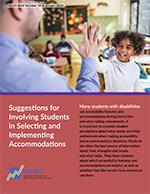Many students with disabilities use accommodations during instruction and when taking assessments. It is important to consider student perceptions about what works as well as their preferences when making accessibility and accommodations decisions. Students are often the best source of information about their strengths and needs. Similarly, it is vital to better understand teachers’ perspectives regarding various accommodations and accessibility features. What have they found to work well? What is challenging about selecting or implementing various accommodations?
NCEO has published two Briefs that summarize the research findings on student and teacher perceptions:
- Suggestions for Involving Students in Selecting and Implementing Accommodations (NCEO Brief #30) summarizes the findings of research studies on student perceptions and preferences for selected accommodations including human read-aloud, text-to-speech, scribe, speech-to-text, extended time, and calculator. It also includes questions that educators can use to help guide accessibility discussions with students before and after administration of a test.
- Teacher Perceptions and Perspectives on the Selection and Implementation of Accommodations (NCEO Brief #34) synthesizes and summarizes research on the perceptions of teachers regarding accommodations. The Brief includes suggestions for effectively including teachers in selecting accommodations and providing valuable feedback on how accessibility features and accommodations are working.
In addition to the two Briefs, NCEO recently hosted two webinars on student and teacher perceptions for State Education Agency (SEA) staff, parent center staff, and other stakeholders. The first webinar was held in February. A recording of this webinar is now available online: What Do Students Prefer? Considering Students’ Perceptions and Preferences when Selecting Accommodations. The second webinar, Teacher Perceptions and Perspectives on the Selection and Implementation of Accommodations, was held in May. It will be posted soon on the NCEO website.

